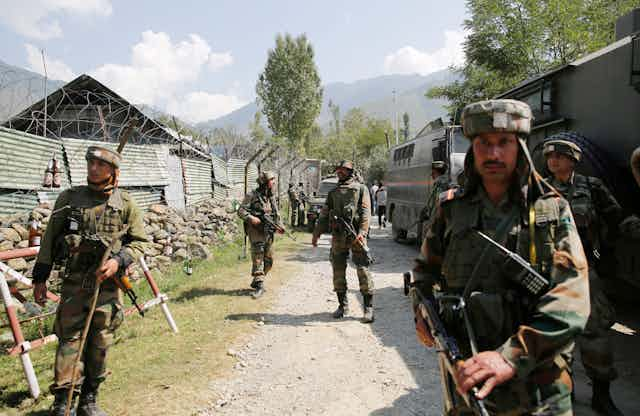In the worst attack against the Indian army in years, militants in Kashmir recently killed 18 soldiers in a predawn raid on an army camp in the town of Uri. Indian Prime Minister Narendra Modi and his government are under growing domestic pressure to launch a military response against suspected terrorist training camps inside Pakistan, with Modi himself declaring that “those behind this despicable attack will not go unpunished”.
Although India has since killed a militant fighter in a skirmish in the area, Modi’s government has so far been quite measured in its responses to what it claims are Pakistani provocations, including the terror strike at the Indian Air Force base at Pathankot in January. But there are signs that India is losing patience, and the government is under heavy domestic pressure to retaliate.
At the highest echelons of Indian government, there is a feeling that Modi’s overtures towards Pakistan’s civilian government have not been reciprocated. In 2014 he invited Pakistani Prime Minister Nawaz Sharif to his government’s swearing-in ceremony, but since then, the relationship has seen more downs than ups.
Modi’s government recognised from the very beginning that as things stand, any effort to strike a durable peace deal with Pakistan is a non-starter. Instead, India’s approach has been to manage its neighbour, which it more often than not views as a nuisance. The real challenge is seen as China, which pledged to invest US$46 billion in Pakistan – and which has made Islamabad a proxy in its struggle for supremacy in Asia more broadly.
Modi also realises that his agenda for enhancing regional co-operation in South Asia won’t get far until the Indian-Pakistani froideur starts to thaw. In a world more interconnected than ever, two such massive neighbours cannot afford to remain forever locked in a spiral of perpetual hostility and violence. But Modi’s expressed intentions to reinvigorate negotiations are seen by some in Pakistan as just another example of Indian diplomatic fickleness – and certain factions within Modi’s own party are still dead against any explicit overtures to Pakistan at all.

This was already the case before increased tensions on the border and the terror attacks in Kashmir.
Sharif’s government in Pakistan has been weakened by corruption charges against its leader and been unable to take on the country’s all-powerful military on Indian issues. Islamabad has reverted to a position that there will be no diplomatic dialogue with India unless the issue of Kashmir is on the agenda.
Seizing the initiative
Both India and Pakistan still claim Kashmir in its entirety, as they have done for more than 60 years. A ceasefire agreed in 2003 remains in place, but both countries often accuse each other of violating it. Pakistan would like to change the status quo; India is very happy to keep things as they are, and apparently lives in hope that it can cement them in place through negotiations.
India’s premise has largely been that a peace process will persuade Pakistan to stop supporting extremists, and start building good neighbourly ties. Pakistan, in contrast, still views the peace process as a means to “make progress” – a euphemism for extracting concessions that India has no intention of making.
For now, it seems the two countries’ differences are irreconcilable – and the Modi government clearly intends to fundamentally reshape the underpinnings of India’s Pakistan policy. It came into office with a view that India should continue to talk since there’s nothing to lose from having some level of diplomatic engagement, but it also resolved to keep pushing back against Pakistani forces along the border.
After years of ceding the initiative to Pakistan, the Modi government wanted to start dictating the terms of the negotiations. But as the recent attack on Indian soldiers and the ensuing outcry both indicate, this is easier said than done while both countries still wield nuclear weapons, and while Pakistan relies on violent non-state proxies to fight its battles.
As did its predecessors, the Modi government is realising that India doesn’t really have any particularly good military options, and New Delhi is yet to find a way to “punish” Pakistan without crossing the nuclear threshold. This is partly thanks to India’s sluggish defence modernisation programme and partly a reflection of the state’s general state of institutional dysfunction.
So in the end, the government’s response in the most recent case has been to try and isolate Pakistan diplomatically. This is unlikely to placate the inflamed mood of the great many Indians who want to see Pakistan made to pay for what they regard as its provocations. The Modi government is navigating dangerous terrain, and its performance in this newly heated atmosphere will be a major test of its strategic competence.

